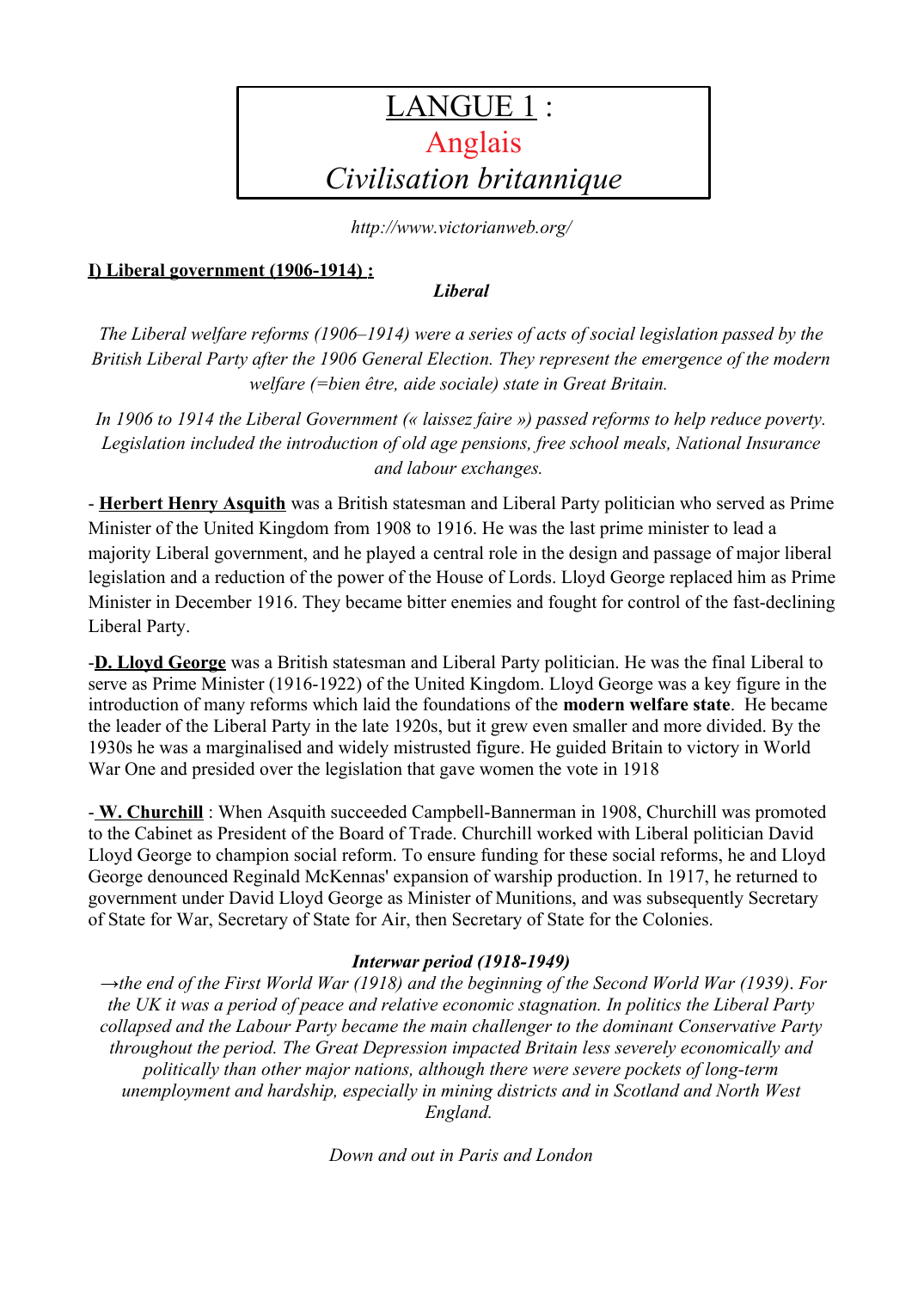Cours de civilisation britannique
Publié le 18/03/2022

Extrait du document
«
http://www.victorianweb.org/
I) Liberal government (1906-1914) :
Liberal
The Liberal welfare reforms (1906–1914) were a series of acts of social legislation passed by the
British Liberal Party after the 1906 General Election.
They represent the emergence of the modern
welfare (=bien être, aide sociale) state in Great Britain.
In 1906 to 1914 the Liberal Government (« laissez faire ») passed reforms to help reduce poverty.
Legislation included the introduction of old age pensions, free school meals, National Insurance
and labour exchanges.
- Herbert Henry Asquith was a British statesman and Liberal Party politician who served as Prime
Minister of the United Kingdom from 1908 to 1916.
He was the last prime minister to lead a
majority Liberal government, and he played a central role in the design and passage of major liberal
legislation and a reduction of the power of the House of Lords.
Lloyd George replaced him as Prime
Minister in December 1916.
They became bitter enemies and fought for control of the fast-declining
Liberal Party.
- D.
Lloyd George was a British statesman and Liberal Party politician.
He was the final Liberal to
serve as Prime Minister (1916-1922) of the United Kingdom.
Lloyd George was a key figure in the
introduction of many reforms which laid the foundations of the modern welfare state .
He became
the leader of the Liberal Party in the late 1920s, but it grew even smaller and more divided.
By the
1930s he was a marginalised and widely mistrusted figure.
He guided Britain to victory in World
War One and presided over the legislation that gave women the vote in 1918
- W.
Churchill : When Asquith succeeded Campbell-Bannerman in 1908, Churchill was promoted
to the Cabinet as President of the Board of Trade.
Churchill worked with Liberal politician David
Lloyd George to champion social reform.
To ensure funding for these social reforms, he and Lloyd
George denounced Reginald McKennas' expansion of warship production.
In 1917, he returned to
government under David Lloyd George as Minister of Munitions, and was subsequently Secretary
of State for War, Secretary of State for Air, then Secretary of State for the Colonies.
Interwar period (1918-1949)
→ the end of the First World War ( 1918 ) and the beginning of the Second World War ( 1939 ) .
For
the UK it was a period of peace and relative economic stagnation.
In politics the Liberal Party
collapsed and the Labour Party became the main challenger to the dominant Conservative Party
throughout the period.
The Great Depression impacted Britain less severely economically and
politically than other major nations, although there were severe pockets of long-term
unemployment and hardship, especially in mining districts and in Scotland and North West
England.
Down and out in Paris and London LANGUE 1 :
Anglais
Civilisation britannique.
»
↓↓↓ APERÇU DU DOCUMENT ↓↓↓
Liens utiles
- La seconde guerre mondiale Cours terminal
- Cours de Philosophie : Le bonheur – Lettre à Ménécée
- Peut-on prédire les cours de la bourse a l'aide des mathematiques ?
- Cours: Histoire des institutions politiques
- Cours droit constitutionnel


